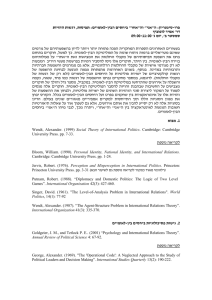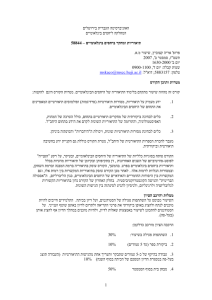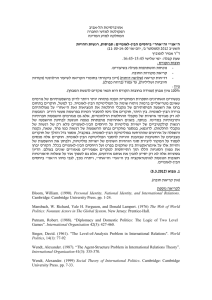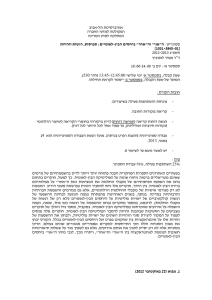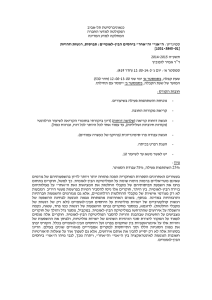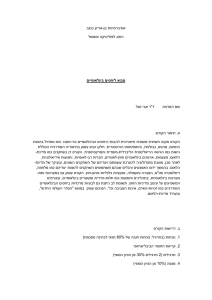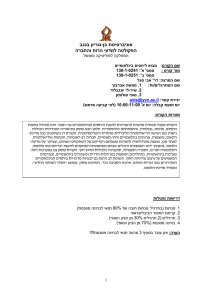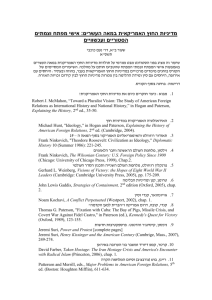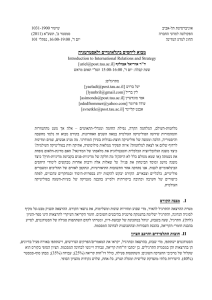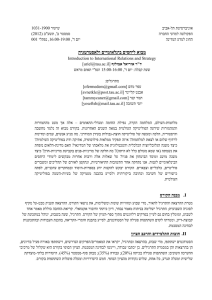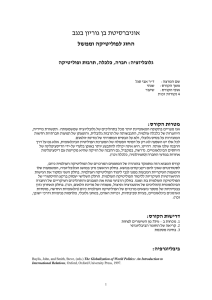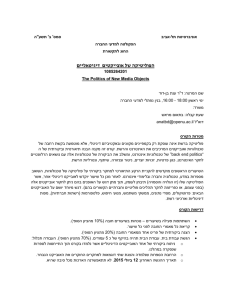ד"ר אמיר לופוביץ, סמסטר ב`, תש"ע 2010-2009
advertisement
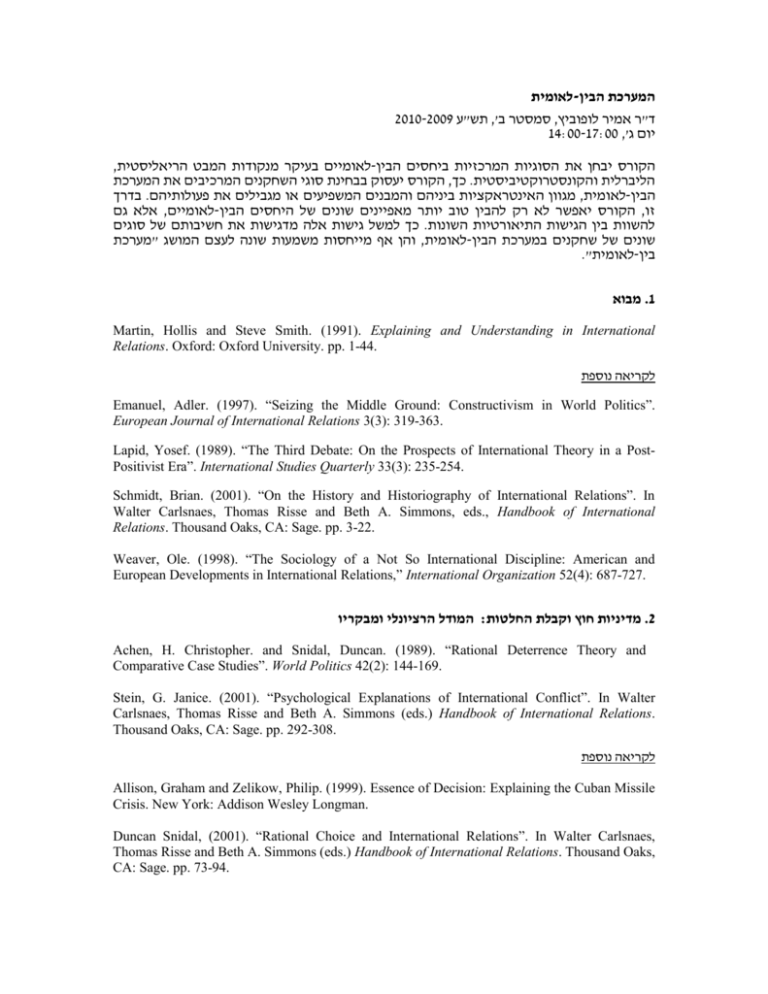
לאומית-המערכת הבין 0202-0222 תש"ע,' סמסטר ב,ד"ר אמיר לופוביץ 00:22-00:22 ,'יום ג ,לאומיים בעיקר מנקודות המבט הריאליסטית-הקורס יבחן את הסוגיות המרכזיות ביחסים הבין הקורס יעסוק בבחינת סוגי השחקנים המרכיבים את המערכת, כך.הליברלית והקונסטרוקטיביסטית בדרך. מגוון האינטראקציות ביניהם והמבנים המשפיעים או מגבילים את פעולותיהם,לאומית-הבין אלא גם,לאומיים- הקורס יאפשר לא רק להבין טוב יותר מאפיינים שונים של היחסים הבין,זו כך למשל גישות אלה מדגישות את חשיבותם של סוגים.להשוות בין הגישות התיאורטיות השונות והן אף מייחסות משמעות שונה לעצם המושג "מערכת,לאומית-שונים של שחקנים במערכת הבין ."לאומית-בין מבוא.1 Martin, Hollis and Steve Smith. (1991). Explaining and Understanding in International Relations. Oxford: Oxford University. pp. 1-44. לקריאה נוספת Emanuel, Adler. (1997). “Seizing the Middle Ground: Constructivism in World Politics”. European Journal of International Relations 3(3): 319-363. Lapid, Yosef. (1989). “The Third Debate: On the Prospects of International Theory in a PostPositivist Era”. International Studies Quarterly 33(3): 235-254. Schmidt, Brian. (2001). “On the History and Historiography of International Relations”. In Walter Carlsnaes, Thomas Risse and Beth A. Simmons, eds., Handbook of International Relations. Thousand Oaks, CA: Sage. pp. 3-22. Weaver, Ole. (1998). “The Sociology of a Not So International Discipline: American and European Developments in International Relations,” International Organization 52(4): 687-727. המודל הרציונלי ומבקריו: מדיניות חוץ וקבלת החלטות.2 Achen, H. Christopher. and Snidal, Duncan. (1989). “Rational Deterrence Theory and Comparative Case Studies”. World Politics 42(2): 144-169. Stein, G. Janice. (2001). “Psychological Explanations of International Conflict”. In Walter Carlsnaes, Thomas Risse and Beth A. Simmons (eds.) Handbook of International Relations. Thousand Oaks, CA: Sage. pp. 292-308. לקריאה נוספת Allison, Graham and Zelikow, Philip. (1999). Essence of Decision: Explaining the Cuban Missile Crisis. New York: Addison Wesley Longman. Duncan Snidal, (2001). “Rational Choice and International Relations”. In Walter Carlsnaes, Thomas Risse and Beth A. Simmons (eds.) Handbook of International Relations. Thousand Oaks, CA: Sage. pp. 73-94. Fearon, D. James. (1995) "Rationalist Explanations of War". International Organization 49)3(: 379-414 Janis ,Iriving. (1982). Groupthink: Psychological Studies of Policy Decisions and Fiascoes. Boston: Houghton Mifflin Company. Cp. 2. Jervis, Robert. (1997). Perception and Misperception in International Politics. Princeton: Princeton University Press. Levy, Jack. (1997). “Prospect Theory, Rational Choice, and International Relations” International Studies Quarterly, 41(1): 87-112. Ruggie, G. John. (1998). "What Makes the World Hang Together? Neo-utilitarianism and the Social Constructivist Challenge". International Organization 52(4): 855-885 ריאליזם- ניאו.3 Mearsheimer, John. (2001). The Tragedy of Great Power Politics. New York: Norton. pp. 1-54. Jervis, Robert. (1978). “Cooperation under the Security Dilemma”. World Politics 30(2): 167214. לקריאה נוספת Ashley K. Richard. (1986). "The Poverty of Neorealism". In Robert O. Keohane )ed.( Neorealism and Its Critics. Columbia University Press. pp. 255-300. Gilpin, Robert. (1986). "The Richness of the Tradition of Political Realism". In Robert O. Keohane, ed., Neorealism and Its Critics. Columbia University Press. pp. 301-321. Waltz, N. Kenneth. (1979). Theory of International Politics. Boston: Addison Wesley. pp. 60128. Waltz, N. Kenneth. (1986). "Reflections on Theory of International Politics: A Response to My Critics". In Robert O. Keohane. (ed.) Neorealism and Its Critics. New York: Columbia University Press. pp. 322-345. .)קלאסי- על ריאליזם ניאו6 '(וראו גם שיעור מס )ליברליזם וביטחון (ותיאורית השלום הדמוקרטי- ניאו.4 Jervis, Robert. (0291). “Security Regime”. In Stephen D. Krasner. (ed.) International Regimes. Ithaca, NY: Cornell University Press pp. 173-194. Maoz, Zeev. (1997). “The Controversy Over the Democratic Peace: Rearguard Action or Cracks in the Wall?” International Security 22(1): 162-198. לקריאה נוספת Duffield, S. John. (1994). “Explaining the Long Peace in Europe: The Contributions of Regional Security Regimes”. Review of International Studies. 20(4): 369-88 Krasner, D. Stephen. (ed.) (1983). International Regimes. Ithaca, NY: Cornell University Press. :ובמיוחד Krasner, Stephen. (1983). “Structural Causes and Regime Consequences: Regimes as Intervening Variables,” in Stephen Krasner, ed., International Regimes. Ithaca, NY: Cornell University Press. pp. 1-22. Owen, John. (1994). "How Liberalism Produces Democratic Peace”. International Security 19(2): 87-125. Russett, M. Bruce (1994). Grasping the Democratic Peace. Princeton: Princeton University Press. pp. 2-42. Zacher, Mark W. and Matthew, A. Richard. (1995). “Liberal International Theory: Common Threads, Divergent Strands”. In Charles W. Kegley, Jr. (ed.) Controversies in International Relations Theory: Realism and the Neoliberal Challenge. New York: St. Martin’s Press. pp. 107150 וגלובליזציה, משטרים, מוסדות:לאומית ואתגריה- המערכת הכלכלית הבין.5 Kacowicz, M. Arie. (1999). “Regionalization, Globalization, and Nationalism: Convergent, Divergent, or Overlapping?” Alternatives 24(4): 527-556. Ruggie, G. John. (1983). “International Regimes, Transactions and Change: Embedded Liberalism in the Post War Economic Order”. In Stephen D. Krasner. (ed.). International Regimes. Ithaca, NY: Cornell University Press pp. 195-232. לקריאה נוספת Bernhard, William, Broz, J. Lawrence, and Clark, William Roberts. (2002). “The Political Economy of Monetary Institutions”. International Organization 56(4): 693-723. Cardozo, Fernando Henrique and Faletto, Enzo. (1979). Dependency and Development in Latin America. Berkeley: University of California Press. Dos Santos, Theotonio. (1970). “The Structure of Dependence” American Economic Review 60(2): 231-36. Keohane, O. Robert and. Nye, S. Joseph. Jr. (1987). “Power and Interdependence Revisited.” International Organization 41(4): 725-753. Wallerstein, Immanuel. (1974). “The Rise and Future Demise of the World Capitalist System: Concepts for Comparative Analysis.” Comparative Studies in Society and History 14(4): 387415. Winham, Gilbert. (1992). The Evolution of International Trade Agreements. Toronto: University of Toronto Press. Zürn, Michael. (2001). “From Interdependence to Globalization”. In Walter Carlsnaes, Thomas Risse and Beth A. Simmons. (eds.) Handbook of International Relations. Thousand Oaks, CA: Sage. pp. 235-254. קלאסי- ריאליזם ניאו.6 Rose, Gideon. (1998). “Neoclassical Realism and Theories of Foreign Policy”. World Politics 51(1): 144-172. Taloaferro, W. Jeffrey, Lobell, E. Steven and Ripsman, M. Norrin. (2009). “Introduction”. In Steve E. Lobell, Norrin M. Ripsman and Jeffrey W. Taliaferro (eds.) Neoclassical Realism, the State, and Foreign Policy. pp. 1-41. לקריאה נוספת Fordham, O. Benjamin. (2009). “The Limits of Neoclassical Realism: Additive and Interactive Approaches to Explaining Foreign Policy”. In Steve E. Lobell, Norrin M. Ripsman and Jeffrey W. Taliaferro (eds.) Neoclassical Realism, the State, and Foreign Policy. pp. 251-279. Glenn, John. (2009). “Realism versus Strategic Culture: Competition and Collaboration?” International Studies Review 11(3): 523-51. Legro, Jeffrey and Moravcsik, Andrew. (1999). “Is Anybody Still a Realist?” International Security. 24(2): 5-55. Ripsman, M. Norrin, Taloaferro, W. Jeffrey, and Lobell, E. Steven (2009). “Conclusions: The State of Neoclassical Realism”. In Steve E. Lobell, Norrin M. Ripsman and Jeffrey W. Taliaferro (eds.) Neoclassical Realism, the State, and Foreign Policy. pp. 1-41. נורמות ולמידה ביחב"ל, רעיונות.7 Finnemore, Martha. and Sikkink, Kathryn. (1998).”International Norms and Dynamics and Political Change”. International Organizations 52(4): 887-917. Goldstein, Judith and Keohane, O. Robert. (eds.) Ideas and Foreign Policy. Ithaca, NY: Cornell University Press. pp. 3-30; 139-206. לקריאה נוספת Breslauer, George and Tetlock, Philip. (eds.) (1991). Learning in U.S. and Soviet Foreign Policy. Boudler: Westview. Checkel, Jeffrey. (2001). "Why Comply? Social Learning and European Identity Change," International Organization 55(3): 553-588. Goldstein, Judith and Keohane, O. Robert. (eds.) Ideas and Foreign Policy. Ithaca, NY: Cornell University Press. pp. 139-206. Haas, M. Peter. (1992). “Introduction: Epistemic Communities and International Policy Coordination”. International Organization 46(1): 1-36. Risse-Kappen, Thomas. (1994). "Ideas Do Not Float Freely: Transnational Relations, Domestic Structures and the End of the Cold War". International Organization, 48(2): 185-214. Schimmelfennig, Frank. (2000). “International Socialization in the New Europe: Rational Action in an Institutional Environment”. European Journal of International Relations 6(1): 109-139. Stein, G. Janice. (1994). "Political Learning by Doing: Gorbachev as Uncommitted Thinker and Motivated Learner". International Organization 48 (2): 155-183 Tannenwald, Nina. (2007). The Nuclear Taboo: The United States and the Non-Use of Nuclear Weapons. New York: Cambridge University Press. pp. 43-72. Yee, Albert. (1996). “The Causal Effect of Ideas on Policy”. International Organization 50(1): 69-108. קונסטרוקטיביזם.8 Ba, Alice. and Hoffmann, Mathew. (2003). “Making and Remaking the World for IR 101: A Resource for Teaching Social Constructivism in Introductory Classes”. International Studies Perspectives 4(1): 15-33. Wendt, Alexander (1992). “Anarchy is What States Make of It: The Social Construction of Power Politics,” International Organization 46(2): 391-425. )(רלוונטי גם לשיעור האחרון לקריאה נוספת Adler, Emanuel. (2002). “Constructivism and International Relation“. In Carlsnaes, Walter, Risse, Thomas and Simmons, A. Beth. (eds.) Handbook of International Relations. Sage. pp. 95118. Checkel, T. Jeffrey (1998) “The Constructivist Turn in International Relations Theory”. World Politics 50(2): 324-348. Farrell, Theo. (2002). “Constructivist Security Studies: Portrait of a Research Program”. International Studies Review 4(1): 49-72. Hacking, Ian (1999). The Social Construction of What? Cambridge: Harvard University. pp. 1-34 Hurd, Ian. (2008). Constructivism. In Christian Reus-Smit and Duncan Snidal (eds.) The Oxford Handbook of International Relations. New York: Oxford University Press. pp. 298-316. Lupovici, Amir. (2009). “Constructivist Methods: A Plea and Manifesto for Pluralism”. Review of International Studies 35(1): 195-218. זהויות ביחב"ל.9 Mitzen, Jennifer. (2006) “Ontological Security in World Politics: State Identity and the Security Dilemma”. European Journal of International Relations 12(3): 341-70. Wendt, Alexander. (1999) Social Theory of International Politics. Cambridge: Cambridge University Press. pp. 215-233. לקריאה נוספת Bially-Mattern, Janice. (2005) Ordering International Representational Force. New York: Routledge. pp. 2-46. Order. Identity, Crisis, and Hopf, Ted. (2002) Social Construction of International Politics. Identities and Foreign Policies, Moscow, 1955 & 1999. Ithaca: Cornell University Press. pp. 1-38. Mercer, Jonathan. (1995) “Anarchy and Identity”. International Organization 49 (2): 229-252. - ואיומים נוספים במערכת הבין, שחקנים נוספים- " לא רק "ביטחון" ולא רק ל"מדינה.11-11 לאומית Buzan, Barry. Waever, Ole and de Wilde Jaap. (1998). Security: A New Framework for Analysis. Boulder: Lynne Rienner. pp. 1-48. Löwenheim, Oded. (2007) Predators and Parasites: Persistent Agents of Transnational Harm and Great Power Authority. Ann Arbor: The University of Michigan Press. pp. 1-54. לקריאה נוספת הרחבת מושג הביטחון Miller, Benjamin. (2001). “The Concept of Security: Should It Be Redefined?” Journal of Strategic Studies 24(2): 13-42. Moravcsik, Andrew. (1999). “Is Something Rotten in the State of Denmark?” Constructivism and European Integration. Journal of European Public Policy 6(4): 669-81. לאומיים-השפעת יחידים על היחסים הבין Keck, E. Margaret and Sikkink, Kathryn. (1998). Activists Beyond Borders: Advocacy Networks in International Politics. Ithaca: Cornell University Press. )?מי-מגדר וביטחון (ביטחון ל Moon, Katharine. (1997). Sex among Allies: Military prostitution in U.S.-Korean Relations. New York: Columbia University Press. pp. 1-56. ביטחון ואיכות סביבה Barnett, Jon. (2007). “Environmental Security”. In Alan Collins (ed.) Contemporary Security Studies. New York: Oxford University Press. pp. 182-203. Zurn, Michael. (1998). “Review Essay: The Rise of International Environmental Politics: A Review of Current Research”. World Politics 50(4): 617-649. הפרטת הביטחון Avant, Deborah. (2006). “The Privatization of Security: Lessons from Iraq”. Orbis 50(2): 327342. Mandel, Robert. (2002). Armies without States: The Privatization of Security. Boulder: Lynne Rienner. pp. 1-72. לאומי- סדרים בין לאומיים וממשול בין,לאומי- הסדר הבין: סיכום.12 Barnett, N. Michael and Duvall, Raymond. (2005). “Power in Global Governance”. In Michael N. Barnett and Raymond Duvall (eds). Power in Global Governance. Cambridge: Cambridge University Press. pp. 1-23. Bull, Hedley. (1977). The Anarchical Society: A Study of Order in World Politics. London: Macmillan. pp. 1-27. לקריאה נוספת Barnett, Michael N. and Duvall, Raymond. (eds). (2005). Power in Global Governance. Cambridge: Cambridge University Press Buzan, Barry. (2004). From international to world society? English school theory and the social Structure of Globalization. Cambridge: Cambridge University Press. pp. 228-70 Luke, W. Timothy. (1993). "Discourses of Disintegration, Texts of Transformation: Re-Reading Realism in the New World Order". Alternatives 18: 229-253 Milner, Helen. (1991). “The Assumption of Anarchy in International Relations Theory: Critique”. Review of International Studies 17(1): 67-85 A Wendt, Alexander. (1992). “Anarchy is What States Make of It: The Social Construction of Power Politics”. International Organization 46(2): 391-425. (הוזכר לעיל בשיעור על )קונסטרוקטיביזם Wendt, Alexander. (2003). “Why a World State is Inevitable”. European Journal of International Relations 9(4): 491-542.
